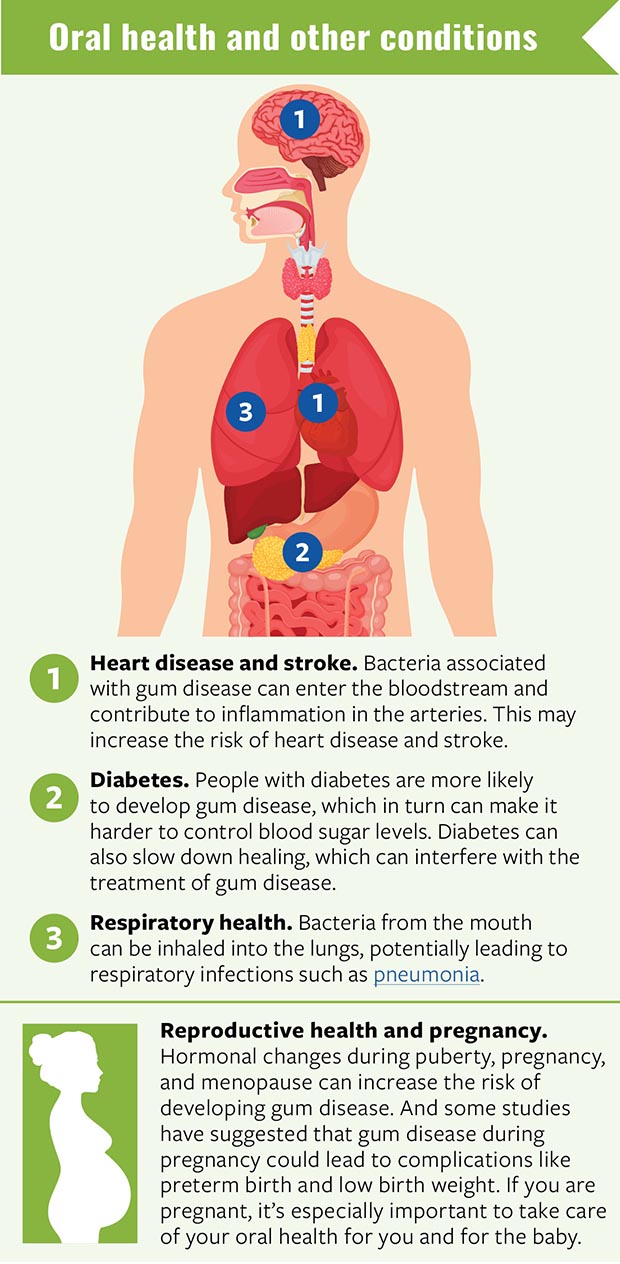
[ad_1]
While you might not realize it, your mouth plays an important role in your health and well-being. Good oral health is about more than just avoiding cavities. It’s about being able to speak, chew, taste, swallow, and express yourself. And having a pain-free mouth allows us to sleep better at night and makes it easier to focus on our everyday routines.
A two-way street: Mouth to body and body to mouth
From the mouth to the body
Your mouth contains bacteria, both good and bad. When harmful bacteria builds up in the mouth, you’re more likely to develop gum disease (inflammation of the tissue around the teeth) and tooth decay (cavities).
If not treated, gum disease and cavities can cause chronic inflammation throughout the body, which can lead to other health conditions.
Harmful bacteria can also travel from your mouth into your bloodstream or digestive system. This may contribute to or even cause health problems.
From the body to the mouth
Certain health conditions and behaviors can negatively affect your oral health.
For example, chronic conditions such as diabetes (where the body has trouble regulating blood sugar) and HIV/AIDS make it harder for the body to fight infections. This can mean trouble for the mouth, including a higher risk of gum disease and a fungal infection called thrush.
Other conditions such as Sjögren syndrome (an autoimmune disease) and certain medications can cause dry mouth, which increases the risk of cavities and other mouth problems. Saliva washes away bacteria and food particles, fights harmful acids from bacteria, and produces minerals that protect the teeth and mouth.
Smoking can contribute to oral health problems, too. It can worsen gum disease and complicate its treatment, increase the risk of oral cancer, and lead to tooth loss. Smoking is also a major health risk for many chronic diseases that are linked to oral health problems.

Keeping your mouth healthy
Having good oral hygiene habits can significantly reduce your risk of developing or worsening oral health problems. And by taking care of your oral health, you’re not just protecting your smile—you’re investing in your overall well-being. Here are some things you can do:
- Eat a balanced diet. Try and limit sugary foods and drinks, a leading culprit behind cavities. Even starchy foods like white bread and potato chips turn into sugar, so enjoy them in moderation.
- Avoid tobacco and alcohol. Smoking and drinking (and especially doing both) increase your risk of oral cancer.
- Brush and floss. Brush twice a day and floss regularly to remove food particles and plaque (a sticky buildup of bacteria).
- Use fluoride. It strengthens teeth and fights cavities! Brush with fluoride toothpaste and consider using a fluoride rinse.
- Visit your dentist. See your dentist for routine checkups and cleanings. By looking at your mouth, dentists can sometimes spot clues about other health problems such as vitamin deficiencies, infections, problems with your immune system, and even oral cancer.
[ad_2]